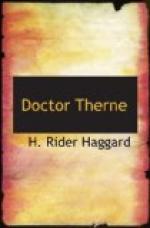Sir Thomas Colford and I, with our little knots of agents and sub-agents, placed ourselves one on each side of the table, waiting in respectful silence while the clerk dealt out the papers, as a player deals out cards. It was an anxious moment, as any one who has gone through a closely-contested parliamentary election can testify. For ten days or more the strain had been great, but, curiously enough, now at its climax it seemed to have lost its grip of me. I watched the denoument of the game with keenness and interest indeed, but as though I were not immediately and personally concerned. I felt that I had done my best to win, and no longer cared whether my efforts ended in success or failure. Possibly this was the result of the apathy that falls upon overstrained nerves. Possibly I was oppressed by the fear of victory and of that Nemesis which almost invariably dogs the steps of our accomplished desires, of what the French writer calls la page effrayante . . . des desirs accomplis. At least just then I cared nothing whether I won or lost, only I reflected that in the latter event it would be sad to have told so many falsehoods to no good purpose.
“How does it stand?” asked the head Conservative agent of the officer.
The clerk took the last numbers from the counters and added up the figures.
“Colford, 4303; Therne, 4291, and two more bundles to count.”
Another packet was counted out.
“How does it stand?” asked the agent.
“Colford, 4349; Therne, 4327, and one more bundle of fifty to count,” answered the clerk.
The agent gave a sigh of relief and smiled; I saw him press Sir Thomas’s hand in congratulations, for now he was sure that victory was theirs.
“The game is up,” I whispered to Strong, who, as my principal supporter, had been admitted with me to the hall.
He ground his teeth and I noticed in the gaslight that his face was ghastly pale and his lips were blue.
“You had better go out,” I said, “you are overtaxing that dilated heart of yours. Go home and take a sleeping draught.”
“Damn you, no,” he answered fiercely in my ear, “those papers come from the Little Martha ward, where I thought there wasn’t a wrong ’un in the crowd. If they’ve sold me, I’ll be even with them, as sure as my name is Strong.”
“Come,” I said with a laugh, “a good Radical shouldn’t talk like that.” For me the bitterness was over, and, knowing the worst, I could afford to laugh.
The official opened the last packet and began to count aloud.
The first vote was for “Therne,” but bad, for the elector had written his name upon the paper. Then in succession came nine for “Colford.” Now all interest in the result had died away, and a hum of talk arose from those present in the room, a whispered murmur of congratulations and condolences. No wonder, seeing that to win I must put to my credit thirty-two of the forty remaining papers, which seemed a thing impossible.




